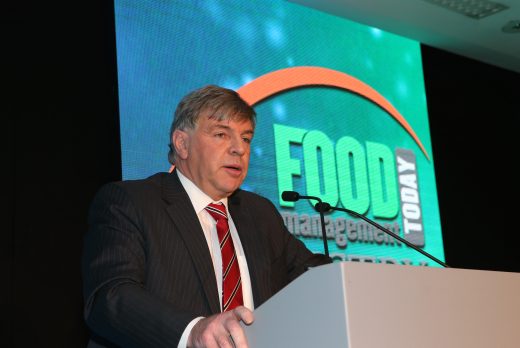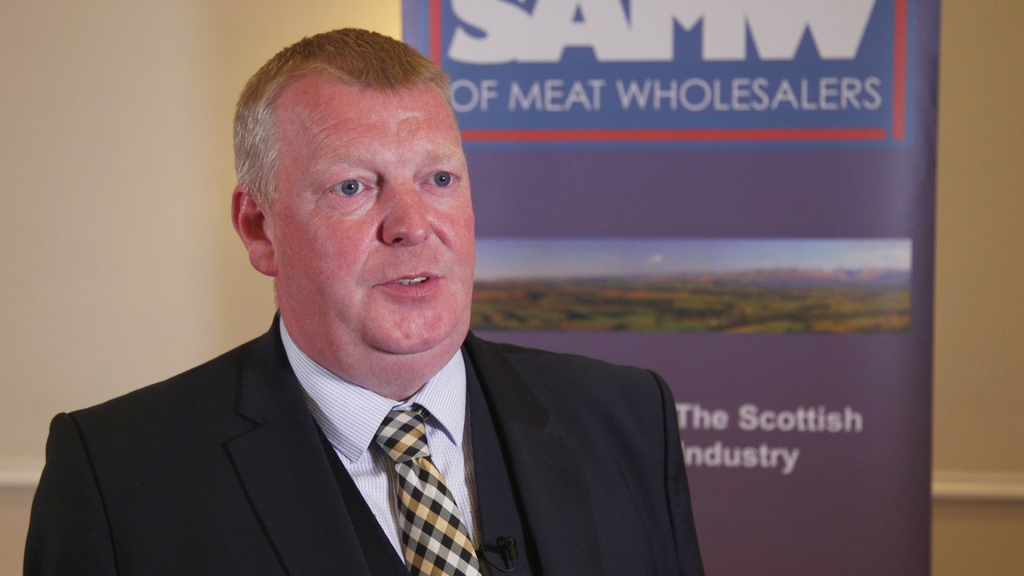Industry predictions for the meat sector 2018
Meat Management asked experts across the meat sector about what they believe 2018 has in store for the industry.
The British Meat Processors Association’s (BMPA) chief executive, Nick Allen, is foreseeing a Brexit-full 2018, with a number of issues that the Government will still have to resolve.

BMPA’s chief executive, Nick Allen.
He commented: “2018 will be completely dominated by Brexit and all that goes with it. We are expecting a busy year trying to make sure that when March 2019 comes, and we officially leave the EU, Government has got everything in place to make sure that the meat industry can function, and keep the fantastic product we produce in this country on the plates of consumers here and abroad.
“Also in 2018 the debate will start in earnest about what the future UK agriculture food policy will look like. Something we have not had to write for ourselves for over 40 years. What the future agriculture policy looks like will influence everyone’s lives and futures regardless of which sector they are in. It will be an exciting year and at BMPA we intend to play our part in shaping the future.”
Head of policy at the Association of Independent Meat Suppliers (AIMS), Norman Bagley, focused on the Food Standards Agency and what he described as the “quiet revolution going on under our noses”.

Head of policy at the Association of Independent Meat Suppliers (AIMS), Norman Bagley.
“As a long term critic of FSA’s negative attitude to industry I am also on record as praising the sea change we have seen over the last couple of years,” he stated. “Gone are the vicious anti industry press briefings and in has come a totally different definition of working in partnership which previously meant ‘it was nice talking to you but it won’t make a scrap of difference, good afternoon’.”
Bagley identified two distinct areas where this becomes clear – the “real hard plant by plant stuff, the on the ground work in identifying issues on staffing and efficiency”, as well as “a different attitude from FSA as to how to regulate in the future”.
He commented: “FSA seeks to return to being a good regulator only and not the grandstanding campaigning group of the past. Whilst of course there is still work to do it is surely good news for industry.”
Finally, on one quick word on Brexit, Bagley noted: “A hostage to fortune for me if it goes wrong but yes we will get a trade deal with EU that means no change.”
International trading
As the UK is moving on to ‘phase 2’ of Brexit negotiations, the International Meat Trade Association (IMTA) is also looking to continue its work on Brexit.

IMTA’s policy director, Katie Doherty.
IMTA’s policy director, Katie Doherty, noted: “In 2017 IMTA ran several sessions to develop our Brexit policy for members looking at how Brexit might impact supply chains including discussions on tariffs, quotas, customs and veterinary checks.
“In 2018, as the negotiations move to the second phase we plan to harness our expertise in trade and will be working more closely with individual member companies to help them to understand how their imports and exports might be impacted.
Poultry
Richard Griffiths, chief executive of the British Poultry Council (BPC), highlighted that BPC will focus on ensuring that “British poultry meat’s success continues for decades to come”.

Chief executive of the British Poultry Council, Richard Griffiths.
He noted: “As we look ahead at 2018, our sector stands committed to bolster the heart of Britain’s food supply. We are going to work with the Government to harness our productivity, drive efficiency and strengthen our supply chains.
“In the new year, we will focus on securing continued access to EU markets for trade and increase our competitiveness at home and abroad by opening third country markets. From increasing our productivity, attracting and nurturing our talent, to ensuring that we have access to non-UK labour in areas where UK labour simply isn’t available; we will do everything we can to ensure that British poultry meat’s success continues for decades to come.”
Scotland
Scotland’s red meat industry mantra for 2018 is ‘livestock, livestock, livestock’, according to Frank Clark, president of the Scottish Association of Meat Wholesalers(SAMW). He explained: “While house buyers think ‘location, location, location’ when considering a new investment, our members definitely see a sustained upturn in livestock supplies as their top three requirements for 2018.

President of SAMW, Frank Clark.
“We would also welcome a good red meat deal on Brexit, of course; alongside a reduction in red tape and a more collaborative approach from the regulatory authorities. For most members, however, the over-whelming need for a stronger supply of Scottish livestock is the issue which overhangs business planning and investment as never before.”
Douglas Scott, chief executive of Scottish Federation of Meat Traders, pointed out that predictions have become “virtually impossible in this world”, and added: “What we do know, in what we are told is an uncertain world, is that there will be continual turmoil until the UK actually leaves the EU. Brexit and issues like global warming may ultimately have an effect on butchers but it is unlikely that will affect their short term profitability.”

Chief executive of Scottish Federation of Meat Traders, Douglas Scott. (Photo: Perthshire Picture Agency).
With regards to Brexit, Scott noted that the “lack of skilled staff is the single most limiting factor on butchers’ businesses”, advising butchers to “develop your workforce, bring on trainees and invest in a new generation to drive your business forward”.
He concluded that “new innovative products are certainly a necessity to keep customers interested but they need to come through the door first”, adding that “by addressing social media they are attracting new customers and new expenditure”.
Northern Ireland
Economist at Livestock & Meat Commission for Northern Ireland (LMC), Seamus McMenamin, highlighted that, during 2017, LMC commissioned a report into the impact for the NI red meat industry if the UK fails to agree a post-Brexit trade deal with the EU and has to instead revert to World Trade Organization trading conditions.

Seamus McMenamin, LMC economist.
McMenamin explained: “The report findings indicated that Northern Ireland beef and sheep meat output could decline by 21%, with exports to the EU collapsing by over 90% if the industry is faced with tariff and non-tariff barrier costs.
“The EU provides an important outlet for the NI beef and sheep meat industry and every effort needs to be made to maintain unfettered access to this valuable market post-Brexit. However it is equally important that on-going work to open market access to countries outside the EU is expanded upon and that new third country market opportunities are available to UK exporters.”
Having access to the “widest possible range of export markets plays an important role in realising the best value for all carcase components”, according to McMenamin, who concluded: “Much essential work continues to be done to open up further market opportunities for the NI beef and sheep meat sectors.
“In 2017, the Philippines reopened for UK beef exports and it is essential that the UK does not get left behind other EU countries that are actively pursuing market access negotiations with important third countries such as China, Japan, USA and the Middle East.”
Independent retailing
The independent retailing sector is also expecting a challenging year ahead, especially with the emergence of new trends and ideas.
Q Guild manager, Claire Holland, highlighted: “Our members often rise to the challenge of new trends and ideas and so I expect 2018 will be no exception; with health and convenience high on people’s agendas I would see this as a prime area for butchers.

Q Guild manager, Claire Holland.
“Health in the form of high protein and low fat, is an easy win for butchers now that health drinks and food are being replaced with ‘real food’. Convenience is already a growing market, whether cooking from scratch to heating a prepared meal. However, where butchers can win is by using their own quality ingredients, which means the consumer doesn’t have to compromise on quality food just because they have less time.
“Online meat sales are still small but growing, and as consumers get to trust and know their suppliers, I can see this being another area where butchers can move into. And of course our home territory is BBQ time, so let’s all hope for a long hot summer.”
The next year also looks to be hopeful for the new generation of butchers, according to Keith Fisher, chief executive of Institute of Meat (IoM), who added: “The Institute of Meat is looking forward to a great year in 2018 with over 300 apprentice members now signed up the meat industry can look forward to a new generation of knowledgeable, skilled, craft butchers.

IoM chief executive, Keith Fisher.
“The Institute is also looking forward to supporting initiatives such as the Premier Young Butcher, International Young Butcher, World Butchers’ Challenge and other competitions which enable young people to demonstrate their skills and grow in confidence. These are excellent platforms for grooming the senior managers of the future and should be backed by the whole industry.”
Foodservice
Finally, 2018 will see the National Association of Catering Butchers (NACB) celebrate its 35th birthday. Policy and market intelligence executive at NACB, Katrina Walsh, commented: “The NACB was formed in 1983 to raise the standard of catering butchery in the UK, so 2018 will see it enjoy its 35th birthday! Since then a lot has changed in the food sector but the NACB standard remains the only one tailored specifically to meat and the unique operation of the catering butcher and is one we are very proud of.

Policy and market intelligence executive at NACB, Katrina Walsh.
“However, NACB will not be complacent and will continue its mission to ensure confidence in meat supplies remains high. 2018 will be a crucial year for the food sector in terms of the Brexit negotiations and NACB will make sure the sector’s voice is heard.”

 Food industry figures among New Year’s Honours recipients
Food industry figures among New Year’s Honours recipients Health benefits of beef highlighted by nutrition expert
Health benefits of beef highlighted by nutrition expert
